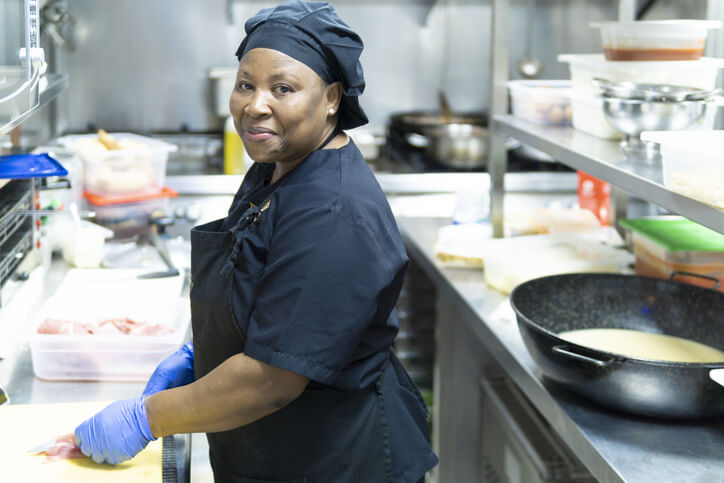
Not to put a fine point, but a Food Services Worker career is serious business. The global food service industry, which encompasses a diverse range of establishments – from Michelin-starred restaurants to bustling cafeterias and convenient quick-service chains – caters to the needs of millions of people in various settings daily.
In Canada, the food service market size is worth an estimated 114.29 billion USD in 2024 and is projected to rise at a compound annual growth rate (CAGR) of 17.96% to reach 261.09 billion USD by 2029.
The numbers are undoubtedly instructive, especially if you’ve been considering entering the industry and wondering if you have the chops to have a successful career in the food service industry. If you possess practical multitasking skills, outstanding customer service abilities, and a passion for helping take care of others, an institutional food service career might be perfect for you. Read on to discover all you need about a healthcare Food Services Worker career.
A Food Service Worker Career: What Is the Food Service Worker’s Job About?
Unlike traditional restaurants, institutional food service caters to specific populations within a particular setting. This could be a hospital preparing meals for patients with dietary restrictions, a school ensuring nutritious lunches for students, or a corporate cafeteria offering various options for busy employees.
Again, unlike their restaurant counterparts, institutional Food Services Workers don’t typically prepare meals from scratch. Instead, they focus on prepping, assembling, and serving pre-portioned ingredients following standardized recipes.
Healthcare Food Services Workers take center stage in ensuring patients receive the nourishment they need for recovery. Healthcare Food Services Worker responsibilities vary widely, depending on the setting. On a typical day, they may prepare essential food items, serve patients or customers directly, or ensure that dining areas remain clean and welcoming.
Their duties cover a range of tasks, from preparing and portioning meals according to specific dietary restrictions to carefully assembling patient trays. They may also be responsible for operating specialized equipment to cater to different food consistencies, ensuring all patients have access to suitable sustenance for their unique needs. Additionally, maintaining a clean and sanitary food preparation environment is paramount, and these workers play a vital role in following strict hygiene protocols to prevent the spread of germs within the healthcare facility.
Regardless of the environment, teamwork and effective communication are crucial, as these professionals work closely with kitchen staff and front-of-house teams to deliver a healthy and nutritious dining experience.

What Are the Requirements to Become a Food Service Worker
The beauty of a Food Services Worker career is that it offers a very low entry barrier. A high school diploma or equivalent is sufficient for many positions, with on-the-job training provided to newcomers.
However, specific roles, especially those in more specialized establishments such as health or long-term care facilities, might require formal training and qualifications, such as the one offered at Medix College. Industry certifications relevant to the Ministry of Health dietary guidelines or food handling can enhance your resume and career prospects.
Hospitals, nursing homes, and assisted living facilities often advertise job openings for Food Services Workers. While previous experience in food service is a plus, many facilities offer on-the-job training programs.
Additionally, there are opportunities for professional development. Physical stamina is also necessary, as the job often involves long hours on your feet, and there may be age requirements for roles involving alcohol service in the Food Service Worker job description.

What Skills Are Important for a Food Services Worker?
Healthcare Food Services Workers need diverse skills, including effective communication, teamwork, attention to detail, compassion and empathy, and a positive attitude to excel in their fast-paced and dynamic work environment.
These skills are fundamental for success in this field. Here’s a detailed explanation of these skills:
- Compassion and Empathy: Understanding the needs of patients and residents is crucial for providing exceptional service.
- Attention to Detail: Following doctor’s orders and ensuring proper dietary adherence requires meticulous attention.
- Communication Skills: The ability to communicate clearly with patients, staff, and dietary specialists is essential.
- Teamwork: Working effectively within a team is key to maintaining a smooth operation in a busy healthcare kitchen.
- Positive Attitude: A friendly and helpful demeanor fosters a welcoming environment for patients and residents during their stay.
Are you interested in joining a Food Services Worker online course?
Contact Medix College for more information.
FAQs
Q: What Is the Food Services Worker’s Job About?
A: Unlike traditional restaurants, institutional food service caters to specific populations within a particular setting. This could be a hospital preparing meals for patients with dietary restrictions, a school ensuring nutritious lunches for students, or a corporate cafeteria offering various options for busy employees.
Q: What Are the Requirements to Become a Food Services Worker
A: The beauty of a Food Services Worker career is that it offers a very low entry barrier. A high school diploma or equivalent is sufficient for many positions, with on-the-job training provided to newcomers. However, specific roles, especially those in more specialized establishments such as health or long-term care facilities, might require formal training and qualifications, such as the one offered at Medix College.
Q: What Skills Are Important for a Food Services Worker?
A: Healthcare Food Services Workers’ need diverse skills, including effective communication, teamwork, attention to detail, compassion and empathy, and a positive attitude to excel in their fast-paced and dynamic work environment.



